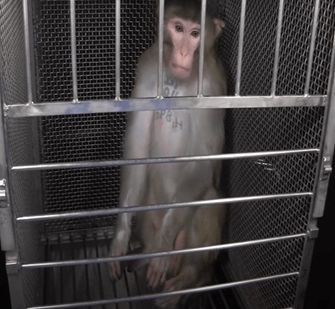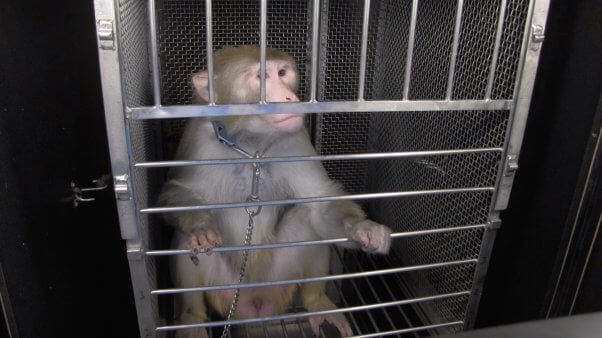NIH, NIMH Sued to Allow Audio-Visual Feed From Inside Federal Monkey Lab
Advances in Understanding of Nonhuman Primate Speech Prompt Unique “Right to Listen” Case
For Immediate Release:
March 6, 2025
Contact:
Tasgola Bruner 202-483-7382
PETA filed a first-of-its-kind lawsuit against the National Institutes of Health (NIH) and the National Institute of Mental Health (NIMH) today seeking to enforce our First Amendment right to receive communications from willing speakers, including the macaque monkeys Beamish, Sam Smith, Nick Nack, and Guinness—fellow primates who are imprisoned in the NIMH laboratory of experimenter Elisabeth Murray.
As part of the well-known right to free speech, the First Amendment to the Constitution guarantees a “right to listen”—a right to receive communications from willing speakers. This right exists even where the speaker may not have her own right to speak under the Constitution. No lawsuit has attempted to enforce the constitutional right to receive communications from animals, who are undoubtedly willing speakers. Vindicating PETA’s right to listen to the macaques and other animals imprisoned in government laboratories will provide vital information to help PETA advocate for their rights and educate the public about their suffering, and it will improve transparency in government laboratories generally.
The suit comes after NIH and NIMH refused PETA’s request for reasonable, uncensored, and unedited access to a live-streamed audio-visual feed of the monkeys in Murray’s laboratory so that we could receive the macaques’ communications and exercise our First Amendment right to listen.
PETA asks the court to declare that NIH’s refusal to allow the requested access violates both the First and Fifth amendments and to require that the defendants provide constitutionally sufficient means for PETA to receive the monkeys’ communications.


“Beamish, Sam Smith, and other monkeys have been imprisoned alone in barren steel cages, cut open, injected with toxins, and brain-damaged for years and, in some cases, over a decade,” says PETA Chief Legal Officer Jeff Kerr. “PETA urges the court to uphold our First Amendment right to hear what these monkeys have to say because their jailers are ignoring their cries of agony and despair.”
PETA’s complaint is accompanied by declarations about macaques and their communications, including specific insight into Beamish, Sam Smith, Nick Nack, and Guinness from primate experts Dr. Agustín Fuentes—a Princeton University professor with expertise in macaques’ interactions with humans—and Dr. Liz Tyson, director of Born Free USA’s primate sanctuary and an Oxford Centre for Animal Ethics fellow with a doctorate in animal welfare law from the University of Essex.
The lawsuit was filed on behalf of PETA by Davis Wright Tremaine LLP.
Monkeys, including macaques, communicate in many ways using a range of different signals. Their abilities to communicate with humans have been studied by scientists for years, and their communications can be interpreted in various ways by both laypersons and experts. These communications include facial expressions, body language, and gestures, along with vocalizations such as screams, calls, and other sounds. Field studies of Japanese macaques, for example, show that this species uses different dialects depending on where they live, and other studies show Campbell’s monkeys in Africa can use suffixes to change the meaning of certain calls. Rhesus macaques, including those in Murray’s laboratory, can communicate through lip-smacking or puckering, teeth-chattering, grimacing, teeth-baring, open-mouth yawns, and more.
According to documents and footage that PETA received through FOIA requests, in Murray’s laboratory, where macaques are largely confined to barren metal cages, the animals frequently tear their hair out due to stress and have been observed pacing and rocking to cope with extreme stress, loneliness, and boredom. Many have metal head posts or other equipment implanted in their skulls, and some have suffered from repeated infections, vomiting, or excessive bleeding after surgeries. NIMH funds Murray’s experiments with taxpayer money.
PETA—whose motto reads, in part, that “animals are not ours to experiment on”—points out that Every Animal Is Someone and offers free Empathy Kits for people who need a lesson in kindness. For more information, please visit PETA.org or follow PETA on X, Facebook, or Instagram.


